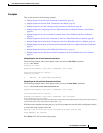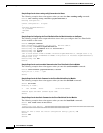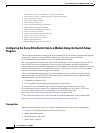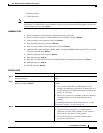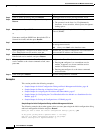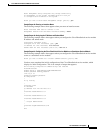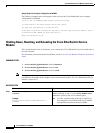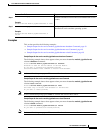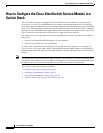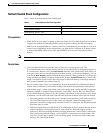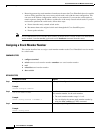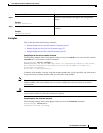
Cisco EtherSwitch Service Modules Feature Guide
How to Configure the Cisco EtherSwitch Service Module
46
Cisco IOS Release 12.2(25)SEC
Examples
This section provides the following examples:
• Sample Output for Initial Configuration Dialog and Basic Management Initiation, page 46
• Sample Output for Entering an Interface Name, page 47
• Sample Output for Assigning the IP Address and Subnet Mask, page 47
• Sample Output for Configuring the Cisco EtherSwitch Service Module as a Standalone Service
Module, page 47
• Sample Output for Saving the Configuration to NVRAM, page 48
Sample Output for Initial Configuration Dialog and Basic Management Initiation
The following example shows what appears when you enter yes to begin the initial configuration dialog
and basic management initiation and press Return:
Would you like to enter the initial configuration dialog? [yes/no]: yes
At any point you may enter a question mark '?' for help.
Use ctrl-c to abort configuration dialog at any prompt.
Default settings are in square brackets '[]'.
Step 4
Enter an enable password, and press Return. Sets the password to access privileged EXEC mode.
Step 5
Enter a virtual terminal (Telnet) password, and press
Return.
Sets the Telnet password.
• The password can be from 1 to 25 alphanumeric
characters, is case sensitive, allows spaces, but ignores
leading spaces.
Step 6
Enter yes to configure SNMP.
or
Enter no to configure SNMP later through the CLI or
Network Assistant, and then press Return.
(Optional) Configures Simple Network Management
Protocol (SNMP).
Step 7
Enter the interface name, and press Return. Provides the interface name of the interface that connects to
the management network.
Note Always use vlan1 as the interface name.
Step 8
When prompted to configure an IP address for the
Cisco EtherSwitch service module, enter yes.
Confirms that you want to configure the Cisco EtherSwitch
service module IP address and subnet mask.
Step 9
Enter the IP address and subnet mask for the Cisco
EtherSwitch service module, and press Return.
—
Step 10
When prompted to enable the Cisco EtherSwitch
service module as the cluster command switch, enter
yes or no.
Configures the Cisco EtherSwitch service module.
• Entering no configures it as a standalone service
module. It appears as a cluster candidate service
module in Network Assistant.
• Entering yes configures it as the cluster command
service module.
Step 11
Enter 2 and press Return. Saves the configuration to NVRAM.
Command or Action Purpose




